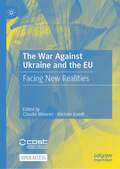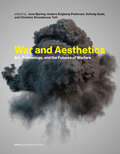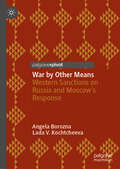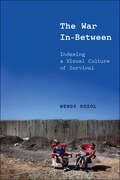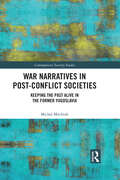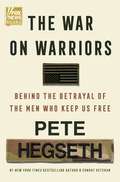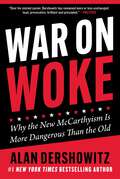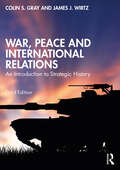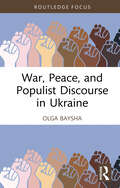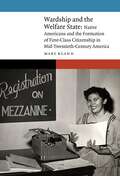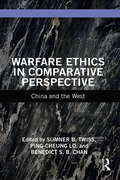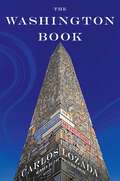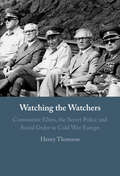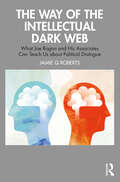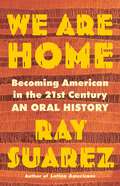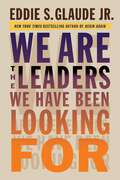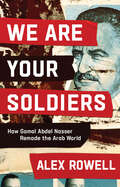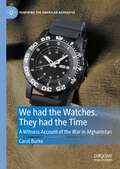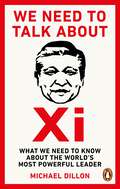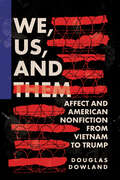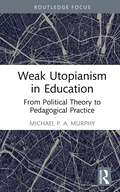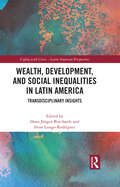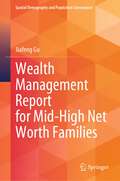- Table View
- List View
The War Against Ukraine and the EU: Facing New Realities
by Claudia Wiesner Michèle KnodtThis open access book aims at discussing the manifold consequences that the War against Ukraine bears for the European Union and EU Studies. It takes stock of the fact that the Russian Attack on Ukraine and the ensuing War not only affects the Global Order, but also has challenged a number of established narratives and convictions for the European Union and its member states. The EU now needs to position itself in the changing world order. Concretely it needs to deal with a number of membership applications, internal and external challenges to liberal democracy, and the development of its strategic autonomy in a number of decisive policy fields. The book convenes experienced scholars, with chapters covering the following themes and fields: Theories, approaches and concepts in EU studies and IR; the EU and the changing European and Global Order; the War and defence of liberal democracy; Membership Politics; Energy Policy.
War and Aesthetics: Art, Technology, and the Futures of Warfare (Prisms: Humanities and War #1)
by Jens Bjering, Anders Engberg-Pedersen, Solveig Gade, and Christine Strandmose ToftA provocative edited collection that takes an original approach toward the black box of military technology, surveillance, and AI—and reveals the aesthetic dimension of warfare.War and Aesthetics gathers leading artists, political scientists, and scholars to outline the aesthetic dimension of warfare and offer a novel perspective on its contemporary character and the construction of its potential futures. Edited by a team of four scholars, Jens Bjering, Anders Engberg-Pedersen, Solveig Gade, and Christine Strandmose Toft, this timely volume examines warfare through the lens of aesthetics, arguing that the aesthetic configurations of perception, technology, and time are central to the artistic engagement with warfare, just as they are key to military AI, weaponry, and satellite surveillance.People mostly think of war as the violent manifestation of a political rationality. But when war is viewed through the lens of aesthesis—meaning perception and sensibility—military technology becomes an applied science of sensory cognition. An outgrowth of three war seminars that took place in Copenhagen between 2018 and 2021, War and Aesthetics engages in three main areas of inquiry—the rethinking of aesthetics in the field of art and in the military sphere; the exploration of techno-aesthetics and the wider political and theoretical implications of war technology; and finally, the analysis of future temporalities that these technologies produce. The editors gather various traditions and perspectives ranging from literature to media studies to international relations, creating a unique historical and scientific approach that broadly traces the entanglement of war and aesthetics across the arts, social sciences, and humanities from ancient times to the present. As international conflict looms between superpowers, War and Aesthetics presents new and illuminating ways to think about future conflict in a world where violence is only ever a few steps away.ContributorsLouise Amoore, Ryan Bishop, Jens Bjering, James Der Derian, Anthony Downey, Anders Engberg-Pedersen, Solveig Gade, Mark B. Hansen, Caroline Holmqvist, Vivienne Jabri, Caren Kaplan, Phil Klay, Kate McLoughlin, Elaine Scarry, Christine Strandmose Toft, Joseph Vogl, Arkadi Zaides
The War Below: Lithium, Copper, and the Global Battle to Power Our Lives
by Ernest ScheyderAn unprecedented look inside the global battle to power our lives from acclaimed Reuters reporter Ernest Scheyder.A new economic war for critical minerals has begun, and The War Below is an urgent dispatch from its front lines. To build electric vehicles, solar panels, cell phones, and millions of other devices means the world must dig more mines to extract lithium, copper, and other vital building blocks. But mines are deeply unpopular, even as they have a role to play in fighting climate change and powering crucial technologies. These tensions have sparked a worldwide reckoning over the sourcing of necessary materials, and no one understands the complexities of these issues better than Ernest Scheyder, whose exclusive access to sites around the globe has allowed him to gain unparalleled insights into a future without fossil fuels. The War Below reveals the explosive brawl among industry titans, conservationists, community groups, policymakers, and many others over whether some places are too special to mine or whether the habitats of rare plants, sensitive ecosystems, Indigenous holy sites, and other places should be dug up for their riches. With vivid and engaging writing, Scheyder shows the human toll of this war and explains why recycling and other newer technologies have struggled to gain widespread use. He also expertly chronicles Washington&’s attempts to wean itself off supplies from China, the global leader in mineral production and processing. The War Below paints a powerfully honest and nuanced picture of what is at stake in this new fight for energy independence, revealing how America and the rest of the world&’s hunt for the &“new oil&” directly affects us all.
War by Other Means: Western Sanctions on Russia and Moscow’s Response
by Angela Borozna Lada V. KochtcheevaThis book analyzes the goals of Western sanctions imposed on Russia from 2014 to 2023. It explores the effects of sanctions on the Russian economy and its political course, as well as the repercussions of the sanctions to the senders and third parties, including spillover effects on neighboring countries and boomerang effects on the senders. While sanctions can be considered relatively effective in terms of economic damage, the Russian economy is far from being crushed. Importantly, sanctions proved to be ineffective as an instrument of foreign policy. They have failed to alter Moscow’s resolve to continue its military operation and are unlikely to change it in the near future. The effects of the sanctions extend well beyond their anticipated impact on Russia itself, primarily due to the Western nations’ limited experience and knowledge in implementing sanctions against a major power with extensive global connections, such as Russia.
The War In-Between: Indexing a Visual Culture of Survival
by Wendy KozolExplores the ambiguities and contradictions that disrupt the assumed boundaries of battle zonesAgainst the fabric of suffering that unfolds around more spectacular injuries and deaths, The War In-Between studies visual depictions of banal, routine, or inscrutable aspects of militarized violence. Spaces of the in-between are both broader and much less visible than battlefields, even though struggles for survival arise out of the same conditions of structural violence. Visual artifacts including photographs, video, data visualizations, fabric art, and craft projects provide different vantage points on the quotidian impacts of militarism, whether it is the banality of everyday violence for non-combatants or the daily struggles of soldiers living with physical and emotional trauma.Three interrelated concepts frame the book’s attempt to “stay” in the moment of looking at visual cultures of survival. First, the concept of the war in-between captures those interstitial spaces of war where violence and survival persist side-by-side. Second, this book expands the concept of indexicality to consider how images of the in-between rely on a range of indexical traces to produce alternative visualities about survival and endurance. Third, the book introduces an asymptotic analysis to explore the value in getting close to the diverse experiences that comprise the war in-between, even if the horizon line of experience is always just out of reach.Exploring the capaciousness of survival reveals that there is more to feel and engage in war images than just mangled bodies, collapsing buildings, and industrialized death. The War In-Between, Kozol argues, offers not a better truth about war but an accounting of visualities that arise at the otherwise unthinkable junction of conflict and survival.
War Narratives in Post-Conflict Societies: Keeping the Past Alive in the former Yugoslavia (Contemporary Security Studies)
by Michal MochtakThis book studies war narratives and their role in the political arenas of post-conflict societies, with a focus on the former Yugoslavia.How do politicians in postwar societies talk about the past war? How do they discursively represent vulnerable social groups created by the conflict? Does the nature of this representation depend on the politicians’ ideology, personal characteristics, or their record of combat service? The book answers these questions by pairing natural language processing tools and large corpora of parliamentary debates collected in three southeast European post-conflict societies (Bosnia-Herzegovina, Croatia, and Serbia). Using the latest advances in computer science, the book explores patterns in the war discourse of the political elites of these countries and discusses how politicians talk about war in terms of common narratives and shared frameworks. Mapping over 20 years of parliamentary debates, the book presents a new perspective on the role of the legacies of war in public space and develops theoretical arguments about reconciliation in post-conflict societies. The wars of the 1990s and the breakup of Yugoslavia have created three totally different settings for remembering the past conflicts in these countries, despite their common history. It is a story of victorious battles (Croatia), past grievances (Bosnia-Herzegovina), and denial (Serbia), showing the different flavors of past wars in various national contexts that are symptomatic of many post-conflict societies in different parts of the world.This book will be of much interest to students of war and conflict studies, southeastern European politics, discourse analysis, and international relations.
The War on Warriors: Behind the Betrayal of the Men Who Keep Us Free
by Pete HegsethReal men fought for our freedoms. It’s time we fought for theirs. <P><P> Pete Hegseth joined the Army to fight extremists. Then that same Army called him one. The military Pete joined twenty years ago was fiercely focused on lethality, competency, and color blindness. Today our brass are following the rest of our country off the cliff of cultural chaos and weakness. <P><P> Americans with common sense are fighting this on many fronts, but if we can’t save the meritocracy of our military, we’re definitely going to lose everywhere else. <P><P> The War on Warriors uncovers the deep roots of our dysfunction—a society that has forgotten the men who take risks, cut through red tape, and get their hands dirty. The only kind of men prepared to face the dangers that the Left pretends don’t exist. Unlike issues of education or taxes or crime, this problem doesn’t have a zip code solution. We can’t move away from it. We can’t avoid it. We have only one Pentagon. Either we take it back or surrender it altogether. <P><P> Combining his own war experiences, tales of outrage, and an incisive look at how the chain of command got so kinked, this book is the key to saving our warriors—and winning future wars. The War on Warriors must be won by the good guys, because when the shooting really starts, they’re the only ones who can save us. <p> <b>New York Times Bestseller</b>
War on Woke: Why the New McCarthyism Is More Dangerous Than the Old
by Alan DershowitzIn War on Woke: Why the New McCarthyism Is More Dangerous Than the Old, Alan Dershowitz—#1 New York Times bestselling author and one of America&’s most respected legal scholars—warns of the danger to the future of civil liberties and equality in America. Alan Dershowitz has been called &“one of the most prominent and consistent defenders of civil liberties in America&” by Politico and &“the nation&’s most peripatetic civil liberties lawyer and one of its most distinguished defenders of individual rights&” by Newsweek. War on Woke exposes new McCarthyite tendencies and tactics of academia, the media, and the business community, especially high tech, that promote closed-minded intolerance. Dershowitz explains that the new woke McCarthyism challenges the basic tenets of the classic liberal (in the traditional sense) state: Freedom of expression; due process; presumption of innocence, right to counsel, equal application of the law; tolerance and respect for differing viewpoints, and that these bedrock principles are rejected by McCarthyite extremists on both the hard left and the hard right. Analyzing the impact of this new woke McCarthyism through the relentless attempts to &“get&” Trump, the attention on the Bidens, and even its international manifestation relative to anti-Semitism, Israel, and the world, Dershowitz investigates the role of media and asks whether the US Supreme Court can constrain this growing threat as new woke McCarthyism becomes mainstream Americanism—especially as the current generation of students and young professionals become our political, media, business, educational, religious, and &“influencer&” leaders.
War, Peace and International Relations: An Introduction to Strategic History
by Colin S. Gray James J. WirtzThis textbook provides a comprehensive introduction to the strategic history of the past two centuries, showing how those 200 years were shaped and reshaped extensively by war. The book takes a broad view of what was relevant to the causes, courses and consequences of conflict. The volume provides students with a strong grounding in the contribution of war to the development of the modern world, from the pre-industrial era to the age of international terrorism and smart weapons. Covering all the major wars of the past two centuries, the third edition has been revised and updated and now includes: new introductory essays at the start of each section to help students recognize historical turning points and strategic themes; revised and updated material on the post-Cold War period, accommodating new developments and contemporary perspectives; new material on non-Western views on strategy, especially Sun Tzu; a new chapter on ‘The age of acceleration and great power competition’, starting with the death of Bin Laden and ending with the Ukraine crisis; a new Conclusion offering a synthesis between the message of earlier editions and the state of strategy today. This textbook will be essential reading for students of strategic studies, security studies, war studies, International Relations and international history.
War, Peace, and Populist Discourse in Ukraine (Routledge Focus on Communication Studies)
by Olga BayshaThis book explores the detrimental effects on global peace of populism’s tendency to present complex social issues in simplistic "good versus evil" terms. Analyzing the civilizational discourse of Ukrainian President Volodymyr Zelensky with respect to the ongoing war between Russia and Ukraine—with his division of the world into "civilized us" versus "barbarian them"—the book argues that such a one-dimensional representation of complex social reality leaves no space for understanding the conflict and has little, if any, potential to bring about peace. To deconstruct the "civilization versus barbarism" discourse propagated by Zelensky, the book incorporates into its analysis alternative articulations of the crisis by oppositional voices. The author looks at the writing of several popular Ukrainian journalists and bloggers who have been excluded from the field of political representation within Ukraine, where all oppositional media are currently banned. Drawing on the discourse theory of Ernesto Laclau and Chantal Mouffe, the author argues that the incorporation of alternative perspectives, and silenced voices, is vitally important for understanding the complexity of all international conflicts, including the current one between Russia and Ukraine. This timely and important study will be relevant for all students and scholars of media and communication studies, populist rhetoric, political communication, journalism, area studies, international relations, linguistics, discourse analysis, propaganda, and peace studies.
War, Peace, and Populist Discourse in Ukraine (Routledge Focus on Communication Studies)
by Olga BayshaThis book explores the detrimental effects on global peace of populism’s tendency to present complex social issues in simplistic "good versus evil" terms. Analyzing the civilizational discourse of Ukrainian President Volodymyr Zelensky with respect to the ongoing war between Russia and Ukraine—with his division of the world into "civilized us" versus "barbarian them"—the book argues that such a one-dimensional representation of complex social reality leaves no space for understanding the conflict and has little, if any, potential to bring about peace.To deconstruct the "civilization versus barbarism" discourse propagated by Zelensky, the book incorporates into its analysis alternative articulations of the crisis by oppositional voices. The author looks at the writing of several popular Ukrainian journalists and bloggers who have been excluded from the field of political representation within Ukraine, where all oppositional media are currently banned. Drawing on the discourse theory of Ernesto Laclau and Chantal Mouffe, the author argues that the incorporation of alternative perspectives, and silenced voices, is vitally important for understanding the complexity of all international conflicts, including the current one between Russia and Ukraine.This timely and important study will be relevant for all students and scholars of media and communication studies, populist rhetoric, political communication, journalism, area studies, international relations, linguistics, discourse analysis, propaganda, and peace studies.
Wardship and the Welfare State: Native Americans and the Formation of First-Class Citizenship in Mid-Twentieth-Century America (New Visions in Native American and Indigenous Studies)
by Mary KlannWardship and the Welfare State examines the ideological dimensions and practical intersections of public policy and Native American citizenship, Indian wardship, and social welfare rights after World War II. By examining Native wardship&’s intersections with three pieces of mid-twentieth-century welfare legislation—the 1935 Social Security Act, the 1942 Servicemen&’s Dependents Allowance Act, and the 1944 GI Bill—Mary Klann traces the development of a new conception of first-class citizenship.Wardship and the Welfare State explores how policymakers and legislators have defined first-class citizenship against its apparent opposite, the much older and fraught idea of Indian wardship. Wards were considered dependent, while first-class citizens were considered independent. Wards were thought to receive gratuitous aid from the government, while first-class citizens were considered responsible. Critics of the federal welfare state&’s expansion in the 1930s through 1960s feared that as more Americans received government aid, they too could become dependent wards, victims of the poverty they saw on reservations. Because critics believed wardship prevented Native men and women from fulfilling expectations of work, family, and political membership, they advocated terminating Natives&’ trust relationships with the federal government. As these critics mistakenly equated wardship with welfare, state officials also prevented Native people from accessing needed welfare benefits. But to Native peoples wardship was not welfare and welfare was not wardship. Native nations and pan-Native organizations insisted on Natives&’ government-to-government relationships with the United States and maintained their rights to welfare benefits. In so doing, they rejected stereotyped portrayals of Natives&’ perpetual poverty and dependency and asserted and defined tribal sovereignty. By illuminating how assumptions about &“gratuitous&” government benefits limit citizenship, Wardship and the Welfare State connects Native people to larger histories of race, inequality, gender, and welfare in the twentieth-century United States.
Warfare Ethics in Comparative Perspective: China and the West (War, Conflict and Ethics)
by Sumner B. Twiss Ping-Cheung Benedict S. B. ChanThis volume explores East Asian intellectual traditions and their influence on contemporary discussions of the ethics of war and peace.Through cross-cultural comparison and dialogue between East and West, this work charts a new trajectory in the development of applied ethics. A sequel to the volume Chinese Just War Ethics, it expands the range of the earlier work and includes attention to Japan and other Eastern and Western traditions for contrastive reflection and engages with the full range of Chinese intellectual traditions for comparative analysis. The book scrutinizes pioneering works such as the Mengzi, the Han Feizi, and the Seven Military Classics, investigating their influence in subsequent times. It also engages with new texts and thinkers such as the Four Books of the Yellow Emperor, Zeng Guofan, Chiang Kai-shek, and Mao Zedong, along with examining recent writings of the scholars of the People’s Liberation Army. The final section of the book identifies and discusses some emerging issues in the comparative study of military ethics, just war and peace that derive from the preceding sections. The volume editors then offer some concluding remarks at the end of the book.This book will be of much interest to students of the ethics of war and peace, just war theory, military ethics, Asian studies and International Relations in general.
The Washington Book: How to Read Politics and Politicians
by Carlos LozadaThe Pulitzer Prize–winning opinion columnist at The New York Times explores how people in power reveal themselves through their books and writings and, in so doing, illuminates the personal, political, and cultural conflicts driving Washington and the nation.As a long-time book critic and columnist in Washington, Carlos Lozada dissects all manner of texts: commission reports, political reporting, Supreme Court decisions, and congressional inquiries to understand the controversies animating life in the capital. He also reads copious books by politicians and top officials: tell-all accounts by administration insiders, campaign biographies by candidates longing for high office, revisionist memoirs by those leaving those offices behind. With this provocative essay collection, Lozada argues that no matter how carefully political figures sanitize their experiences, positions, and records, no matter how diligently they present themselves in the best and safest and most electable light, they almost always let slip the truth. They show us their faults and blind spots, their ambitions and compromises, their underlying motives and insecurities. Whether they mean to or not, they tell us who they really are. In his memoirs and speeches, Barack Obama constantly invoked the power and meaning of his life story, Lozada notes, a sign of how the former president capitalized on his personal symbolism, trying to transform it from inspiration on the campaign trail into an all-purpose governing tool. In a soliloquy about his hair in a self-help book published two decades ago, Donald Trump revealed not just his vanity, Lozada explains, but his utter isolation from the world, long before he entered the bubble of the White House. In deft and lacerating prose, Lozada interprets the unresolved tensions of Hillary Clinton&’s ideological beliefs. He imagines the wonderful memoir George H.W. Bush could have given us but instead left scattered in throughout various books and letters. He explores why Kamala Harris has struggled to carve out a distinctive role as vice president. He explains how Ron DeSantis&’s pitch to America is just a list of enemies. And he even glimpses what Vladimir Putin fears the most, and why he seeks conflict with the West. He does so all through their own books, and their own words. Lozada reads these books so you don&’t have to. The Washington Book is the perfect guide to the state of our politics, and then men and women who dominate the terrain. It explores the construction of personal identity, the delusions of leadership, and that mix of subservience and ambition that can define a life in politics. The more we read the stories of Washington, Lozada contends, the clearer our understanding of the competing visions of our country.
Watching the Watchers: Communist Elites, the Secret Police and Social Order in Cold War Europe
by null Henry ThomsonThroughout history, dictators have always constructed secret police agencies to neutralize rivals and enforce social order. But the same agencies can become disloyal and threatening. This book explores how eight communist regimes in Cold War Europe confronted this dilemma. Divergent strategies caused differences in regimes of repression, with consequences for social order and political stability. Surviving the shock of Josef Stalin's death, elites in East Germany and Romania retained control over the secret police. They grew their coercive institutions to effectively suppress dissent via surveillance and targeted repression. Elsewhere, ruling coalitions were thrown into turmoil after Stalin's death, changing personnel and losing control of the security apparatus. Post-Stalinist transitions led elites to restrict the capacity of the secret police and risk social disorder. Using original empirical analysis that is both rigorous and rich in fascinating detail, Henry Thomson brings new insights into the darkest corners of authoritarian regimes.
The Way of the Intellectual Dark Web: What Joe Rogan and His Associates Can Teach Us about Political Dialogue
by Jamie Q RobertsRoberts presents a rigorous and accessible assessment of the Intellectual Dark Web’s origins, shared philosophy, cultural importance, and limitations. Since the mid-2010s, the Intellectual Dark Web (IDW) has been an unprecedented cultural and intellectual phenomenon. Using primarily podcasts and YouTube videos, a new generation of public intellectuals has appeared, loosely coalesced, and gained a vast global audience. This movement has encompassed a range of individuals, notably Joe Rogan, Jordan Peterson, Eric and Bret Weinstein, Ben Shapiro, Heather Heying, and Sam Harris. Other names more broadly associated with the grouping have included Steven Pinker, Jonathan Haidt, Elon Musk, Niall Ferguson, and Stephen Fry. There is a sprawling and ever-growing list of those who have appeared on IDW podcasts and videos, started their own podcasts along similar lines, and share a general ethos. It is a dispersed movement, but a significant one, given the reach of these various online outlets is in the millions globally. Roberts draws together and synthesises the core ideas espoused by the members of this movement and critically assesses its origins, coherence, and the impact it has had on politics and public discourse. He asks – to what extent has the IDW lived up to its professed goal of moving beyond polarisation and radicalisation? An insightful read both for followers of the IDW looking for a coherent and critical overview and for students of popular culture looking to understand this massive but decentralised popular intellectual movement.
We Are Home: Becoming American in the 21st Century: an Oral History
by Ray SuarezFrom a veteran broadcaster and historian comes a richly reported portrait of the newest Americans, immigrants from all over the globe who are living all across the country, filled with their own voices. We are a nation of immigrants, never more than now. In recent decades, the numbers have skyrocketed, thanks to people coming from many continents—especially Asia, Africa, and South America. Just like their predecessors, they face countless obstacles, including political hatred. And yet, just like their predecessors, they work hard. They persist. And they become us. The newest Americans are poorly understood and frequently presented only in stereotypes. Veteran journalist, broadcaster, and interviewer Ray Suarez has criss-crossed the country to speak to new Americans from all corners of the globe, and to record their stories. This portrait of our newest citizens is full of their own, compelling voices. It&’s a story as old as the country, yet each new wave of arrivals tells that classic story in new and crucially important ways.
We Are the Leaders We Have Been Looking For (The W. E. B. Du Bois Lectures)
by Eddie Glaude Jr.From the author of the New York Times bestseller Begin Again, a politically astute, lyrical meditation on how ordinary people can shake off their reliance on a small group of professional politicians and assume responsibility for what it takes to achieve a more just and perfect democracy.“Like attending a jazz concert with all of one’s favorite musicians…James Baldwin, Martin Luther King, Jr., Malcolm X, Ella Baker, Toni Morrison, and more…Glaude brilliantly takes us on an epic tour through their lives and work.”―Henry Louis Gates, Jr., author of The Black Box: Writing the RaceWe are more than the circumstances of our lives, and what we do matters. In We Are the Leaders We Have Been Looking For, one of the nation’s preeminent scholars and a New York Times bestselling author, Eddie S. Glaude Jr., makes the case that the hard work of becoming a better person should be a critical feature of Black politics. Through virtuoso interpretations of Martin Luther King, Jr., Malcolm X, and Ella Baker, Glaude shows how we have the power to be the heroes that our democracy so desperately requires.Based on the Du Bois Lectures delivered at Harvard University, the book begins with Glaude’s unease with the Obama years. He felt then, and does even more urgently now, that the excitement around the Obama presidency constrained our politics as we turned to yet another prophet-like figure. He examines his personal history and the traditions that both shape and overwhelm his own voice.Glaude weaves anecdotes about his evolving views on Black politics together with the writings of Ralph Waldo Emerson, John Dewey, Toni Morrison, James Baldwin, and Ralph Ellison, encouraging us to reflect on the lessons of these great thinkers and address imaginatively the challenges of our day in voices uniquely our own.Narrated with passion and philosophical intensity, this book is a powerful reminder that if American democracy is to survive, we must step out from under the shadows of past giants to build a better society—one that derives its strength from the pew, not the pulpit.
We Are Your Soldiers: How Gamal Abdel Nasser Remade the Arab World
by Alex RowellA searing exploration of authoritarianism in the Middle East through the legacy of Gamal Abdel Nasser’s years in power in Cold War–era Egypt. Gamal Abdel Nasser, the larger-than-life Egyptian president who ruled for eighteen years between the coup d’état he led in 1952 and his death in 1970, is best known for wresting the Suez Canal from the British and French empires and befriending such iconic revolutionaries as Fidel Castro and Che Guevara. Yet there is a darker side to Nasser’s regime. He was a brutal authoritarian, whose legacy, Alex Rowell argues, lies at the heart of the violent and repressive order that still prevails throughout the Arab world today. We Are Your Soldiers examines seven countries—Egypt, Iraq, Syria, Lebanon, Jordan, Yemen, and Libya—weaving the epic tale of Nasser’s dramatic encounters with each to reassess his impact in the Arab sphere. These engagements were often drenched in blood and destruction, leaving deep scars that endure to the present. Rowell shows how the Nasser years were crucial to the formation of regimes as varied as Bashar al-Assad’s Syria, Muammar al-Gaddafi’s Libya, Saddam Hussein’s Iraq and Abd al-Fattah al-Sisi’s Egypt. Crushing democracy at home while launching wars and slaying opponents abroad, Nasser ushered in the long political winter from which the region is still yet to emerge. Drawing on a deep reading of Arabic sources, extensive interviews, and material never before published in English, Rowell offers a necessary reexamination of Nasser’s rule and a new understanding of the politics of the Middle East.
We had the Watches. They had the Time: A Witness Account of the War in Afghanistan (Renewing the American Narrative)
by Carol BurkeThis book focuses on the war in Afghanistan. In 2010 and 2011, the author took a leave from her faculty position at the University of California, Irvine to train and then deploy as a cultural advisor with two U.S. Army combat units in Afghanistan. Her account begins with the U.S. Army’s four-month training program for cultural advisors, follows her deployment, much of it on missions to remote and volatile areas far from brigade headquarters, and concludes with her uneasy return home.She examines the everyday lives of Americans sent to conduct a war of counterinsurgency, including their sexual exploits on base, their superstitions, even the heroic accounts that military contractors recount in their personal stories of past wars, stories that are sometimes a little too good to be true. In turn, she explores the views of ordinary Afghans to this American occupation.
We Need To Talk About Xi: What we need to know about the world’s most powerful leader
by Michael DillonMeet the most powerful leader in the world. Chinese premier Xi Jinping graces our television screens and news headlines on a regular basis. But even after a decade in power, he remains shrouded in mystery.From growing up with a father purged in Mao's Cultural Revolution and his mission to eradicate poverty, to his persecution of Uyghur Muslims and paranoia about being likened to Winnie-the-Pooh, Xi Jinping is a man obscured by caricatures. In this short, essential primer, historian and writer Michael Dillon unveils the character of Xi Jinping - arguably the world's most powerful man - to truly understand his grip on China, what he wants and how the West gets him wrong.But this is not just the story of Xi; this is the story of today's largest economic powerhouse, which dives into the crux of the issue - what does Xi's leadership of China mean for the rest of the world, and what will he do next?
We, Us, and Them: Affect and American Nonfiction from Vietnam to Trump (Cultural Frames, Framing Culture)
by Douglas DowlandWhen Americans describe their compatriots, who exactly are they talking about? This is the urgent question that Douglas Dowland asks in We, Us, and Them. In search of answers, he turns to narratives of American nationhood written since the Vietnam War—stories in which the ostensibly strong state of the Union has been turned increasingly into an America of us versus them. Dowland explores how a range of writers across the political spectrum, including Hunter S. Thompson, James Baldwin, and J. D. Vance, articulate a particular vision of America with such strong conviction that they undermine the unity of the country they claim to extol. We, Us, and Them pinpoints instances in which criticism leads to cynicism, rage leads to apathy, and a broad vision narrows in our present moment.
Weak Utopianism in Education: From Political Theory to Pedagogical Practice (Rethinking Education)
by Michael P. MurphyIn the light of the structural dangers of revolutionary change highlighted in the political theory of Giorgio Agamben, this book joins a lively debate in philosophy of education on weak utopianism as an approach that foregrounds and respects the educational potentiality of teachers and students. Utopian moves in education call for revolutionary changes in pedagogical practice in pursuit of a particular vision of the good. Whether grounded in emancipatory politics, technological enthusiasm, or another social movement, utopian moves are seductive in their promise of a better alternative. Weak Utopianism in Education draws together philosophy of education, political theory, scholarship of teaching and learning research, and utopian thought to advocate for a modest and humble approach to change. The theoretical foundation of weak utopianism opens space for educator’s personal convictions and teaching philosophies to tinker with their own pedagogical practices. The book creates a common conceptual meeting ground for philosophers and practitioners in education.
Wealth, Development, and Social Inequalities in Latin America: Transdisciplinary Insights (Coping with Crisis - Latin American Perspectives)
by Hans-Jürgen Burchardt Irene Lungo-RodríguezIn this book, Hans-Jürgen Burchardt and Irene Lungo-Rodríguez lead a transdisciplinary team of experts to advance our understanding of wealth in Latin America. Combining conceptual discussions with empirical research, they analyze characteristics of wealth, and the implications for inequality. Three thematic sections provide a unique overarching structure to understand the economic, social, political, and cultural complexity of wealth. Questions examined include: What economic, institutional, and structural factors contribute to the excessive accumulation of wealth? What political dynamics promote the concentration of wealth and power? What type of social, political, and economic relations are generated in these contexts of extreme wealth concentration? What socio-cultural processes contribute to legitimizing and reproducing wealth? What are the local, regional, and national socio-ecological effects of these dynamics? Wealth, Development and Social Inequalities in Latin America provides thought-provoking reading for students and researchers alike who wish to look beyond the Global North for answers on the importance of studying wealth.
Wealth Management Report for Mid-High Net Worth Families (Spatial Demography and Population Governance)
by Jiafeng GuThis book analyzes the wealth management of mid-high net worth individuals and families. As China's economy develops and people's living standards improve, more and more families are becoming well-off and the middle-income group continues to expand. After creating wealth and becoming rich, better guarding, spreading and enjoying wealth is not only an urgent challenge faced by more and more micro-families, but also an inevitable need to enrich and energize people's livelihood and the connotation of a good life.Mid-high net worth people are an organic part of China's middle-income group, as well as the future coordinates of many families that have just crossed into the middle-income group. An accurate portrait of this group and an in-depth study of the needs, habits, ways and effects of their family wealth management and distribution are conducive to better responding to the demands of affluent families to "keep, pass on and enjoy wealth," as well as exploring the path of solidly promoting common prosperity at the micro-family level. From this perspective, Institute of Social Science Survey of Peking University has conducted a panoramic analysis on mid-high net worth people from panel survey with more 16,000 households in China after 10 years of tracking and investigation, from six aspects: behavioral patterns, financial asset allocation, non-financial asset allocation, commercial insurance allocation, children's commercial medical insurance allocation and pension insurance allocation, the importance of which is self-evident. As the first systematic work on asset allocation and insurance protection of Chinese middle and high net worth families, although part of the purpose is to explore the demand for insurance protection and develop the commercial insurance market, there is no doubt that this study is an important reference for the government to formulate social security policies and for financial institutions to optimize the supply of family wealth services.
